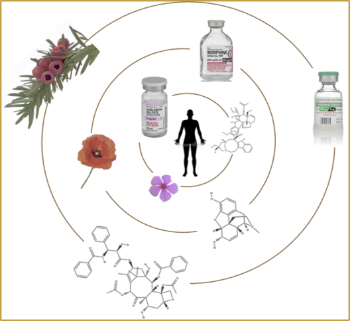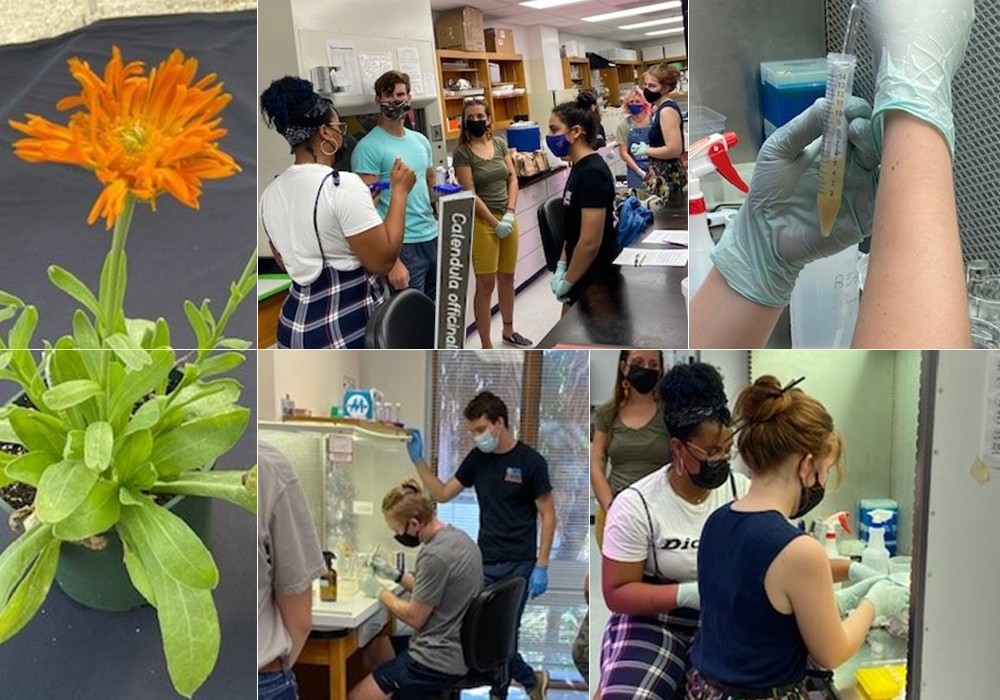Courses
IDS2935: Quest 2: Plants for Human Medicine
 The class is centered around the question, “Can we explore plants for human medicine to address current societal health problems?”. Childhood leukemia is treated with vincristine and vinblastine drugs derived from Madagascar periwinkle plant, anti-chemotherapeutic drug taxol was first isolated from bark of pacific yew trees, opioids such as morphine and codeine are derived from opium poppy plants, etc., Several such discoveries have led to Nobel Prizes in Physiology or Medicine since they have impacted millions of lives across the globe. As the quest for new medicines for various human diseases continues, it’s never been more urgent to understand the origins of chemical diversity of life on planet Earth.
The class is centered around the question, “Can we explore plants for human medicine to address current societal health problems?”. Childhood leukemia is treated with vincristine and vinblastine drugs derived from Madagascar periwinkle plant, anti-chemotherapeutic drug taxol was first isolated from bark of pacific yew trees, opioids such as morphine and codeine are derived from opium poppy plants, etc., Several such discoveries have led to Nobel Prizes in Physiology or Medicine since they have impacted millions of lives across the globe. As the quest for new medicines for various human diseases continues, it’s never been more urgent to understand the origins of chemical diversity of life on planet Earth.
- We will learn about bioactive compounds first discovered in plants that provided modern medicines and serve as stimulus and inspiration for synthetic drugs
- We will discuss the role of plants in various pressing societal problems such as opioid crisis, pain management, mental health etc., in a multidisciplinary way
- Think-pair-share, discussions, self-reflection papers and campus tours related to plants-health-medicine
Syllabus for IDS2935
HOS2002C: Introduction to Medicinal Plants
“Introduction to medicinal plants” surveys a series of plants across the globe used in traditional and modern medicines and/or diets to improve human health. We will focus on aspects related to ethnobotany and chemistry at a basic level for non-experts and discuss the scientific evidence and research underlying some of the plant-derived drugs. We will also learn about the basics of plant metabolism, botany, nomenclature and taxonomy of medicinal plants and various guest lectures on medicinal plant research at the University of Florida. The class will be structured to include lectures, interactive classroom discussions, experiencing live plants we are studying about, propagating of selected medicinal plants and making simple herbal preparations. Our learning experience will conclude with a tour of medicinal plants around UF's main campus and plants used in research in UF/IFAS.
- Survey the medicinal plants used in traditional and modern medicine
- Evaluate the ethnobotanical use of plants and existing scientific evidence
- Learn about the basics of plant metabolism – how plants make these medicinal compounds?
- Overview of isolation, purification, and identification of medicinal compounds from medicinal chemistry experts
- Tour with us to see some of the ethnobotanically significant plants around UF campus
- Let's have fun in class with hands-on activities on herbal preparations to taste and propagation of medicinal plants to take
Syllabus for

HOS6932: Principles and Applications of Omics Technologies to Advance Plant Biology
Recent advancement in technologies have revolutionized plant biology research especially in the fields of genome editing, high throughput sequencing, metabolomics etc., The main goals of this three-credit course are 1) To broadly review molecular technologies applied in plant science research emphasizing on recently evolving CRSIPR based gene editing applications and transformation advancements in plants and 2) Prepare graduate students to critically evaluate scientific literature and introduce the students to proposal writing
- Survey the current ‘omics’ approaches for plant research
- CRISPR based gene-editing - Guide RNA design and CRISPR constructs
- Plant genetic transformation and advances
- Metabolomics advances
- Critically review and analyze scientific literature
- Practice independent research proposal writing and oral presentations
Syllabus for HOS6932
HOS5516C: Cultivation, extraction, and application of medicinal plants and their bioactive compounds
Instructors: Dr. Brian Pearson, Dr. Swathi Nadakuduti and Dr. Chris McCurdy
Strong interest in cultivation, extraction and use of medicinal crops has recently emerged in the fields of plant science, biochemistry and pharmacology. This three-credit graduate-level course will focus on development of a more thorough understanding of plant production and management as well as secondary plant compound synthesis, extraction, analysis, and use. This course is co-taught by faculty in the UF/IFAS College of Agriculture and Life Sciences and the UF College of Pharmacy to prepare students for careers in natural plant product development and commercial cultivation of medicinal crops. Significant emphasis will be placed on the cultivation and use of Cannabis sativa, Mitragyna speciosa, and Piper methysticum.
- Examine and critique the influence of production factors on synthesis of secondary plant compounds cultivated and extracted for use as human medicines
- Successfully propagate, selectively prune, harvest, and dry select, high-value medicinal plant species
- Prepare and perform plant sample extractions to isolate bioactive compounds
- Organize, manage, and perform analytical procedures to accurately quantify plant secondary metabolites
- Predict and explain the pharmacodynamics associated with select plant compounds
- Propose appropriate procedures for successful research on medicinal chemistry and drug interactions
- Evaluate principles of drug actions and their use as therapeutics
Syllabus for
Any Questions? Please email: s.nadakuduti@ufl.edu
